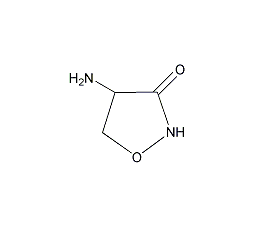D-cycloserine

Structural formula
| Business number | 01FD |
|---|---|
| Molecular formula | C3H6N2O2 |
| Molecular weight | 102.09 |
| label |
(R)-(+)-cycloserine, D-4-amino-3-isoxazolidinone, cycloserine, D-4-amino-3-isoxazolidinone, 4-Amino-3-isoxazolidinone, (R)-4-Amino-3-isoxazolidinone, Cycloserine, Genetic engineering research reagents |
Numbering system
CAS number:68-41-7
MDL number:MFCD00005353
EINECS number:200-688-4
RTECS number:NY2975000
BRN number:80798
PubChem number:24892907
Physical property data
1. Properties: Colorless needle-like or leaf-like crystals or amorphous powder
2. Density (g/mL, 25/4℃): Uncertain
3 . Relative vapor density (g/mL, air=1): Uncertain
4. Melting point (ºC): 155-156 (decomposition)
5. Boiling point (ºC, normal Pressure): Uncertain
6. Boiling point (ºC, 5.2kPa): Uncertain
7. Refractive index: Uncertain
8. Flash point ( ºC): Uncertain
9. Specific optical rotation (º): 111 º (C=5, 2N NaOH)
10. Autoignition point or ignition temperature (ºC): Uncertain
11. Vapor pressure (kPa, 25ºC): Uncertain
12. Saturated vapor pressure (kPa, 60ºC): Uncertain
13. Heat of combustion (KJ/mol): Uncertain
14. Critical temperature (ºC): Uncertain
15. Critical pressure (KPa): Uncertain
16. The logarithmic value of the oil-water (octanol/water) partition coefficient: Uncertain
17. The upper explosion limit (%, V/V): Uncertain
18. The lower explosion limit (%, V/V): Uncertain
19. Solubility: Soluble in water, slightly soluble in methanol, ethanol, butanol, propylene glycol, isopropyl alcohol and acetone, hardly soluble or insoluble in toluene, Chloroform, ether, pyridine, benzene and carbon disulfide
Toxicological data
None
Ecological data
None
Molecular structure data
1. Molar refractive index: 22.47
2. Molar volume (cm3/mol): 79.8
3. Isotonic specific volume (90.2K ): 201.9
4. Surface tension (dyne/cm): 40.8
5. Polarizability (10-24cm3): 8.90
Computing chemical data
1. Hydrophobic parameter calculation reference value (XlogP): -1.5
2. Number of hydrogen bond donors: 2
3. Number of hydrogen bond acceptors: 3
p>
4. Number of rotatable chemical bonds: 0
5. Number of tautomers: 5
6. Topological molecular polar surface area (TPSA): 64.4
7. Number of heavy atoms: 7
8. Surface charge: 0
9. Complexity: 92.9
10. Isotopic atoms Quantity: 0
11. Determine the number of atomic stereocenters: 1
12. Uncertain number of atomic stereocenters: 0
13. Determine the chemical bond establishment Number of stereocenters: 0
14, Number of uncertain chemical bond stereocenters: 0
15, Number of covalent bond units: 1
Properties and stability
None
Storage method
This product should be sealed and stored in a cool, dry place away from light.
Synthesis method
Cycloserine can be prepared by fermentation or direct synthesis. The bacteria produced by the fermentation method is Actinomyces laven-dulae, and the fermentation medium is dextrin, glucose, starch, soybean cake powder, yeast powder, ammonium sulfate, ammonium nitrate, calcium carbonate, sodium chloride, magnesium sulfate and soybean oil, etc. The synthesis method is to react β-aminooxyalanine ethyl ester dihydrochloride with potassium hydroxide to obtain cycloserine through cyclization.
Purpose
Antibiotic drugs. For infections caused by drug-resistant Mycobacterium tuberculosis.
extended-reading:https://www.bdmaee.net/cell-improvement-agent/extended-reading:https://www.bdmaee.net/bis3-dimethylaminopropylamino-2-propanol/extended-reading:https://www.cyclohexylamine.net/dabco-t-12-tin-catalyst-dabco-t-12-catalyst-t-12/extended-reading:https://www.bdmaee.net/nt-cat-la-300-catalyst-cas10861-07-1-newtopchem/extended-reading:https://www.bdmaee.net/niax-b-4-tertiary-amine-catalyst-momentive/extended-reading:https://www.morpholine.org/category/morpholine/page/5390/extended-reading:https://www.newtopchem.com/archives/45087extended-reading:https://www.bdmaee.net/dibutyl-tin-bis-1-thioglycerol/extended-reading:https://www.newtopchem.com/archives/1677extended-reading:https://www.cyclohexylamine.net/dabco-delay-type-catalyst-delay-type-strong-gel-catalyst/


